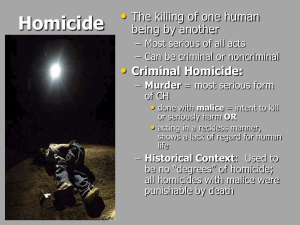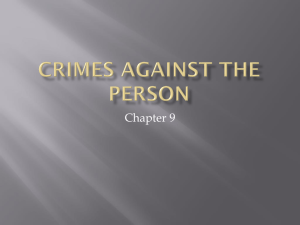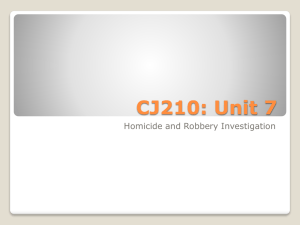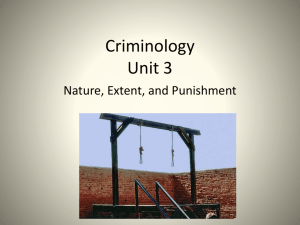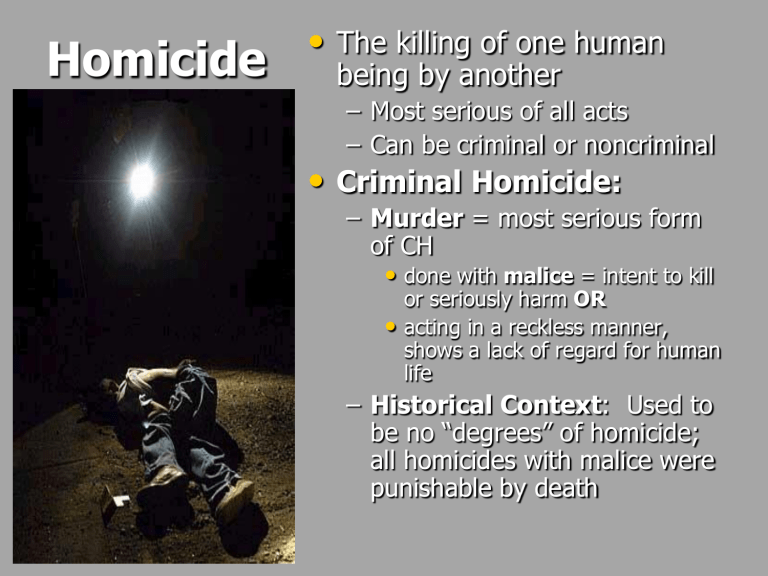
Homicide • The killing of one human being by another – Most serious of all acts – Can be criminal or noncriminal • Criminal Homicide: – Murder = most serious form of CH • done with malice = intent to kill or seriously harm OR • acting in a reckless manner, shows a lack of regard for human life – Historical Context: Used to be no “degrees” of homicide; all homicides with malice were punishable by death Homicide Statistics Criminal Homicide Cont… • First Degree Murder: – premeditated, deliberate and done with malice – *premeditation and deliberation can occur very close to the time of the homicide • Second Degree Murder: – done with malice – No premeditation or deliberation – Intent to kill did not exist until the moment of the murder – Intentional, but spontaneous killing that is unplanned • Euthanasia vs. Assisted Suicide: – What’s the difference? • Assisted Suicide vs. Euthanasia Physician Assisted Suicide Laws Criminal Homicide Cont… • Felony Murder: – occurs during commission of certain felonies (arson, rape, robbery etc…) – Not necessary to prove intent to kill (malice) – Malice is assumed b/c murder was committed during the felony…even if it was accidental – *Most state consider felony murder to be firstdegree murder even though malice, premeditation and deliberation do not need to be proven – The Case of Trevor Jones in Colorado, 17 Years Old, Life W/O Parole Criminal Homicide Cont… • Voluntary Manslaughter: – Killing that would be considered murder, but victim did something to killer that would cause a reasonable person to lose self-control or act rashly (ex- catching spouse with another in a passionate manner) – Killing must occur just after the being provoked • Killer cannot have an opportunity to “cool down” – Punished somewhat less harshly due to the “frailty of human character” – Scott Roeder-Murder of Abortion Clinic Doctor in Kansas Criminal Homicide Cont… • Involuntary Manslaughter: – Unintentional Killing – Results from conduct so reckless that it causes extreme death or bodily injury – Ex: playing with a gun that is known to be loaded – Pharmacist Charged With Involuntary Manslaughter • Negligent Homicide: – Causing of death through criminal negligence – Negligence = failure to exercise reasonable or ordinary amount of care, causes harm to someone – Most Common: Vehicular Homicide – Some states classify “gross or extreme” negligence as involuntary manslaughter Noncriminal Homicide • Killing that is justifiable or excusable • Killer is deemed faultless • Examples: – Killing of an enemy soldier in wartime – Killing condemned criminal by an executioner – Killing by a police officer of a person who is committing a serious crime (must pose threat of death or serious harm/self-defense) Suicide • Deliberate taking of one’s own life. – a plea for help – Someone who helps can be found guilty of murder or manslaughter. • Every 15 minutes. – 3rd leading cause of deaths among 10-24 yr. olds. Kidnapping • Unlawful imprisonment, or abduction. – Originally referred to stealing children. • When taken across state lines, it’s a federal crime.
